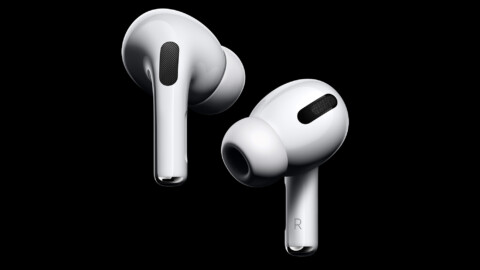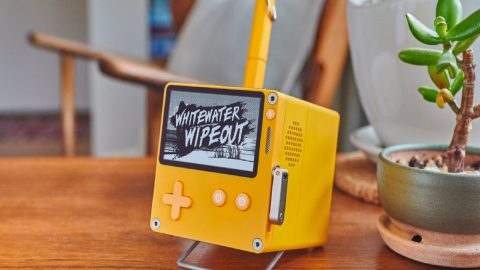
When she came back home in 2019 after touring her second album ‘Historian’ around the world, Lucy Dacus knew that Richmond, Virginia couldn’t be her home anymore. The realisation of having outgrown the place you were born and raised in hits you slowly but firmly, and nudges you towards somewhere new.
“For some reason I felt just immediately displaced,” she tells NME two years later from her new home 300 miles away in Philadelphia, which she moved to just weeks before quarantine began last March and shares with six housemates. “I felt embarrassed walking around and knowing that I had changed so much, and the city itself had changed a lot, and everybody I knew had changed.”
Engulfed by the feeling, she wrote ‘Hot & Heavy’, the first single and opening track from third album ‘Home Video’: “Being back here makes me hot in the face,” she sings. In its accompanying video, she sits chomping on popcorn in a cinema, watching her earliest memories on VHS. “I started writing a lot of songs about the pre-music part of my life,” she says, “just trying to remember who I was and trying to come to terms with some of the things that I believed, for better or worse. It was mostly an attempt to centre myself.”
Leaving a childhood home or hometown always brings a stock check with it, reflecting on where you’ve come from, and how those experiences set you up for where you hope to go next. For Dacus, these feelings pour out across ‘Home Video’, her best and most personal album yet.
Dacus’ second album, 2018’s ‘Historian’, was one of the most-loved indie-rock records of that year, helmed by the huge, anthemic lead single ‘Night Shift’. On ‘Home Video’, she takes this sound and makes it even more widescreen. While honing in on more specific and personal memories and emotions, the music has become more universal.
‘Hot & Heavy’ opens the album with an ambitious wave of Springsteen-esque grandeur, the natural successor to her brilliant cover of ‘Dancing In The Dark’, released last year to celebrate the birthdays of both Springsteen himself and Dacus’ father, “the biggest Bruce fan I know”.
“You used to be so sweet, now you’re a firecracker on a crowded street,” she sings on the track, recounting judgements she’d be faced with by those back home after touring the world and returning to find that nothing was the same.
“What people want from me is to make something genuine”
‘VBS’ (short for vacation bible school, events where Dacus spent a large amount of her childhood), sees her remembering her first boyfriend “who loved Slayer and weed more than Jesus”. “Your poetry was so bad / it took a lot to not laugh,” she sings, remembering how she tried to save him from his dangerous vices, though allowed his tendency to snort nutmeg to persist.
‘Partner In Crime’ then sees the singer getting romantic (“You drop a hint that you got a girlfriend / I try my best not to take it,”) while ‘Brando’ smirks at bad poetry over music that straddles country and skittish pop: “All I need for you to admit, is you never knew me like you thought you did,” goes the anthemic refrain.
Then there’s ‘Thumbs’, the album’s devastating centrepiece. A staple of the singer’s live shows for years, the track has become an elusive fan favourite – the Twitter account @releasethumbs was set up in 2020 purely to ask the simple question: “Has Lucy released ‘Thumbs’ yet?”.
The studio version of the track fulfils every ounce of its live potential. A song about Dacus’ fantasy of murdering the father of a close friend, the heaviness of the story is transmitted perfectly via minimal synths set below Dacus’ powerful, unflinching voice. “You don’t owe him shit even if he said you did,” she tells her friend, directing the sentiment at anyone else who needs to hear it.

One priority Dacus had when creating the new album was to keep a sense of fun. Though the album has its heavy moments, most notably crushing highlight ‘Thumbs’, it was also vital to the singer that she also included a lightness and looseness to proceedings. From the widescreen, road-trip-ready drive of ‘Hot & Heavy’ to ‘VBS” outro of screaming guitars, she pulls it off perfectly.
This subversion of fixed expectations can be traced back to her work alongside Phoebe Bridgers and Julien Baker in the band boygenius. “The fact that we’re women is kind of the most boring that I could think of,” Dacus said around the launch of the band, and the project – which has so far yielded a four-track EP and full-length US tour – served as a ‘fuck you’ to preconceptions of the three artists, and the lack of space for nuance given to women in indie-rock.
Since the release of the boygenius EP, all three members have prepared or released wildly varying new albums; Bridgers’ 2020 masterpiece ‘Punisher’ took things to ethereal, spacey new plains, while Baker went full-on post-rock on this year’s ‘Little Oblivions’ and Dacus is about to emerge with the crunchy, classic-rock feel of ‘Home Video’.
“That was one of the best things about [boygenius],” Dacus reflects now. “I think we were all a little surprised that people were like, ‘Oh yeah, they all sound the same’,” she adds. “We’re like, ‘All of our music sounds very different from each other!’ I can see how we inspire each other on a personal level, but our music is all very different.
“I think it was a little bit offensive because obviously the people who said that were just shrinking us down to a similar category for identity reasons. Maybe the space that we all tend to take up is similar, but sonically and artistically, I just think there’s more nuance than that.”
‘Home Video’ was largely recorded in a 10-day burst in August 2019 – “I really like fast paced recording, not thinking too hard and trusting your initial instinct,” she says – meaning Dacus will have sat with the record for nearly two years by the time it’s released on June 25 (it was slowly, remotely mixed and mastered across the second half of 2020 during lockdown).
Over that time, the meanings of the record have slowly come to the singer. It’s far from a full stop to her past though, as she explains. “I think [meanings] are gradually revealed, and honestly, this record is just one step on the staircase of revelation. These things all happened to me, and after many years have passed I’ve been able to put words to them through this album, but I’m sure as more time passes I’ll learn more. The record will exist forever, but it’s actually just the middle of a story.”
As well as personally, ‘Home Video’ also continues Dacus’ professional evolution, shelving expectations in favour of open-hearted honesty, even if it goes against the grain of what she has become known for. “I do feel like people expect things from me, but I don’t really care,” she says defiantly. “I’m at the point now where I’ve realised that what people actually want from me is to make something genuine, and it’ll be worse if I try to people please.”
“I should just relax and figure out who I am, instead of trying to be somebody”
Come March 2020, with the new album written, recorded and ready to be mixed, the whole world caught up with Dacus’ recent preoccupation with interrogating the past. Having carved out a new album from her childhood memories, did she continue to go down the nostalgia rabbit hole when the rest of us started to do so in lockdown?
“All these books on the shelf are journals, all of them,” she smiles, pointing towards a stacked bookcase behind her in her home office. “For the first time in my life, I went back to day one of my journals [from childhood] and started typing up everything. I was putting that off for a long time because I thought, ‘I’m still really kind of close to these events, and I don’t need to know what happened two, three years ago’.
“So I ended up typing up until I got to 16 and then I was like, ‘I’m gonna stop doing this, and wait a little longer’. So yeah, it’s trippy. I feel a little sense of reversion sometimes when I spend too long in the past.
“It feels kind of dangerous but also informative,” she adds of wading through the past, the idea fresh in her mind after her mother came to visit the week before we speak in late May, complete with armfuls of home videos from Dacus’ childhood.
“We were watching one from when I was in fifth grade [10-11 years old], when I was at my least self confident. I was just a pudgy little baby, I didn’t have that many friends, and I was just entering puberty and didn’t want to talk to my parents and I was clearly just embarrassed to be alive.
“I remember that feeling of thinking, ‘I’m never going to get out of this’, you know? Like I’m never going to feel better than I do right now. I can imagine my solution at the time was to say, ‘Well, I guess God’s probably going to come and get me. The rapture is going to happen soon, so I guess I’ll just go to heaven soon so I don’t really have to worry about how awful my life feels.’”
While nostalgia for nostalgia’s sake is common, living in the past for a while can also help us with regards to how to make steps forward, working out what to take with us from our former lives into the future, as well as – maybe more importantly – what to leave behind.
“What it teaches me is that my brain is a sieve,” Dacus reflects of this contemplative period of her life, and the glistening album that was born out of it. “I can’t hold too tightly to my memories because I’m going to inevitably forget or manipulate my own memory without choosing to do so.
“Because of that, it feels like the pressure’s off in a way,” she says with an eye on the future. “At all times, you are someone and becoming someone. And whether you’re trying or not, that’s the case, and it makes me feel like I should just be true to the moment. I feel like I’m not actually that good at figuring out how I feel in any particular situation, so I should just relax and figure out who I am, instead of trying to be somebody.”
‘Home Video’ is released June 25 on Matador Records
The post Lucy Dacus: “This record is just one step on the staircase of revelation” appeared first on NME.






